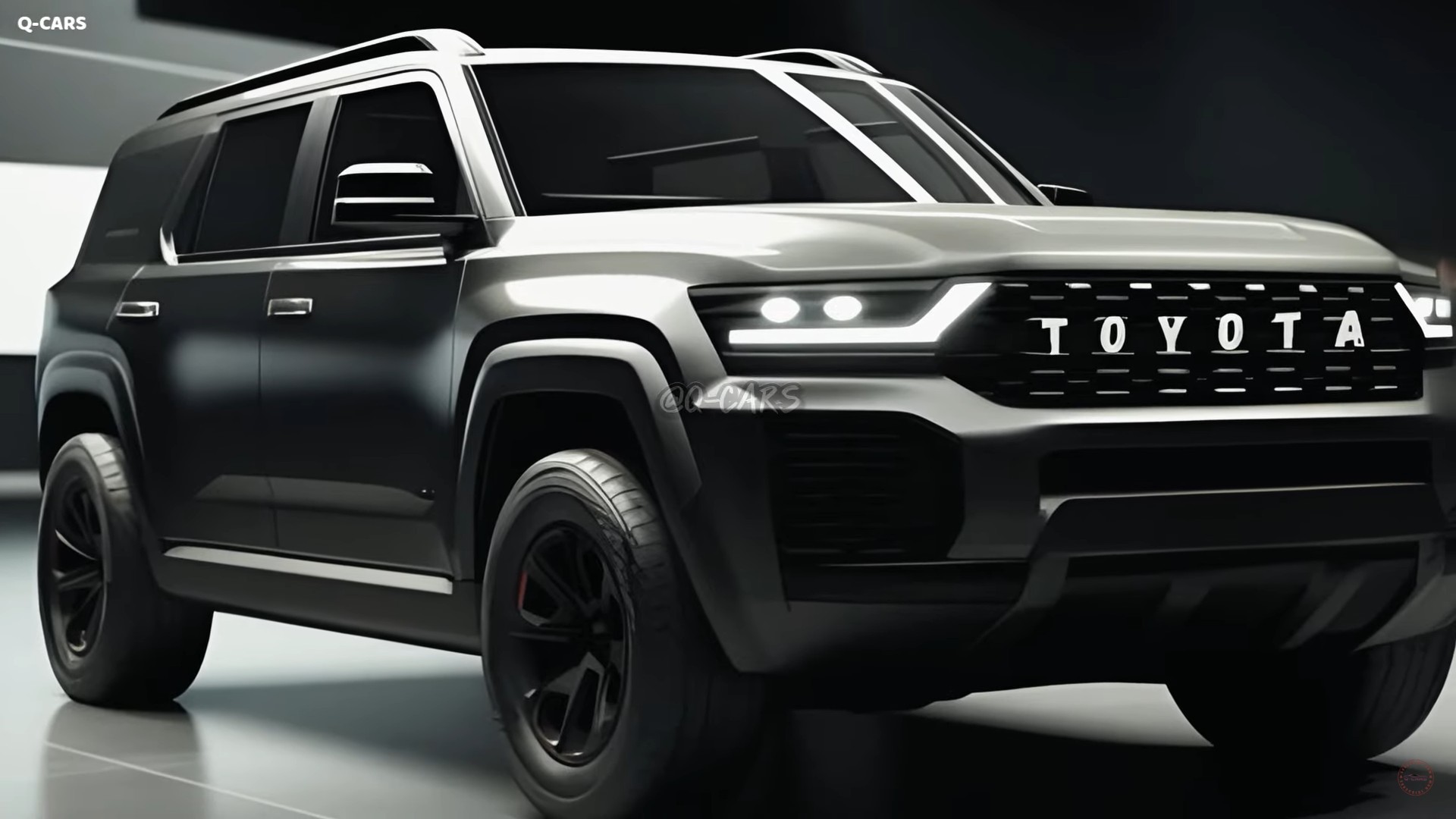The 2025 Toyota 4Runner: Fuel Efficiency in a Rugged Package
Related Articles: The 2025 Toyota 4Runner: Fuel Efficiency in a Rugged Package
Introduction
With enthusiasm, let’s navigate through the intriguing topic related to The 2025 Toyota 4Runner: Fuel Efficiency in a Rugged Package. Let’s weave interesting information and offer fresh perspectives to the readers.
Table of Content
The 2025 Toyota 4Runner: Fuel Efficiency in a Rugged Package

The Toyota 4Runner, a stalwart of the SUV segment known for its off-road prowess and durable build, has traditionally been a vehicle less celebrated for its fuel economy. However, the 2025 model year marks a potential turning point, with Toyota hinting at significant advancements in fuel efficiency for the iconic 4Runner. While official figures remain under wraps, industry experts and analysts anticipate a notable improvement in the 4Runner’s gas mileage, fueled by a combination of technological enhancements and a renewed focus on optimization.
Understanding the Factors Influencing Fuel Efficiency
To delve into the potential fuel efficiency gains of the 2025 4Runner, it’s crucial to grasp the key factors influencing a vehicle’s fuel consumption. These factors can be broadly categorized into two main groups:
1. Vehicle Design and Technology:
- Engine Technology: Modern engines, incorporating technologies like direct injection, variable valve timing, and turbocharging, optimize combustion and reduce fuel consumption.
- Transmission Efficiency: Advanced transmissions, such as continuously variable transmissions (CVTs) and multi-speed automatics, can enhance fuel efficiency by seamlessly adapting gear ratios to varying driving conditions.
- Aerodynamics: Streamlined body designs and aerodynamic features, such as active grille shutters, reduce drag, minimizing the energy required to move the vehicle through the air.
- Weight Optimization: Lighter materials, such as high-strength steel and aluminum, are increasingly employed in vehicle construction to reduce overall weight, thereby improving fuel efficiency.
- Hybrid Systems: The integration of hybrid technology, combining a gasoline engine with an electric motor, can significantly enhance fuel economy, particularly in urban driving conditions.
2. Driving Habits and Environmental Factors:
- Driving Style: Aggressive acceleration, frequent braking, and excessive idling all contribute to increased fuel consumption. Adopting a smooth and anticipatory driving style can significantly improve fuel efficiency.
- Tire Pressure: Under-inflated tires increase rolling resistance, leading to higher fuel consumption. Maintaining proper tire pressure is crucial for optimal fuel efficiency.
- Vehicle Load: Carrying heavy loads or towing trailers places a greater strain on the engine, increasing fuel consumption.
- Environmental Conditions: Factors like altitude, temperature, and wind conditions can also influence fuel efficiency.
Anticipated Fuel Efficiency Improvements in the 2025 4Runner
While Toyota has remained tight-lipped about specific fuel economy figures for the 2025 4Runner, several factors suggest a potential improvement in gas mileage:
- Engine Updates: Rumors circulate about the 2025 4Runner receiving a revised version of its current V6 engine, potentially incorporating direct injection technology, variable valve timing, or even a mild hybrid system. These modifications could lead to a noticeable increase in fuel efficiency.
- Transmission Enhancements: Toyota might introduce a new, more efficient transmission for the 2025 4Runner, possibly a 10-speed automatic or even a CVT, further optimizing gear ratios and minimizing fuel consumption.
- Aerodynamic Refinements: While the 4Runner’s boxy design inherently limits aerodynamic efficiency, Toyota might introduce subtle changes, like active grille shutters or redesigned side mirrors, to reduce drag and improve fuel economy.
- Weight Reduction: The 2025 4Runner might employ lighter materials in its construction, contributing to a decrease in overall weight and, consequently, improved fuel efficiency.
The Importance of Fuel Efficiency in the 2025 4Runner
The potential fuel efficiency gains in the 2025 4Runner are significant not only for its impact on the environment but also for its implications for the vehicle’s overall practicality and affordability.
- Reduced Fuel Costs: Improved fuel economy translates to lower fuel costs for owners, making the 4Runner a more cost-effective option, particularly for those who frequently travel long distances.
- Environmental Sustainability: Lower fuel consumption directly translates to reduced carbon emissions, contributing to a cleaner environment and mitigating the effects of climate change.
- Enhanced Range: Increased fuel efficiency allows the 4Runner to travel further on a single tank of gas, making it a more suitable choice for long road trips and off-road adventures.
FAQs Regarding Fuel Efficiency in the 2025 4Runner
1. What is the expected fuel economy of the 2025 4Runner?
While official figures are yet to be released, industry experts anticipate a significant improvement in fuel economy compared to previous models. Estimates range from a 10% to 20% increase in fuel efficiency, depending on the specific engine and transmission configurations.
2. Will the 2025 4Runner offer a hybrid option?
Toyota has not officially confirmed a hybrid option for the 2025 4Runner. However, the increasing popularity of hybrid SUVs and the company’s focus on electrification suggest a possibility of a hybrid variant in the future.
3. How will the 2025 4Runner’s fuel economy compare to its competitors?
The 2025 4Runner’s fuel economy is expected to be more competitive in its segment, potentially aligning with or surpassing the fuel efficiency of similar SUVs from other manufacturers.
4. What are the key factors affecting the 2025 4Runner’s fuel efficiency?
The 2025 4Runner’s fuel efficiency will be influenced by a combination of factors, including engine technology, transmission efficiency, aerodynamics, weight optimization, and driving habits.
5. Will the 2025 4Runner’s fuel efficiency impact its off-road capabilities?
The anticipated improvements in fuel efficiency are unlikely to significantly compromise the 4Runner’s renowned off-road capabilities. Toyota is expected to maintain the vehicle’s ruggedness and off-road prowess while enhancing its fuel economy.
Tips for Optimizing Fuel Efficiency in the 2025 4Runner
- Drive Smoothly: Avoid aggressive acceleration and braking, opting for a smooth and anticipatory driving style.
- Maintain Proper Tire Pressure: Regularly check and adjust tire pressure to the manufacturer’s recommendations.
- Minimize Unnecessary Weight: Remove any unnecessary items from the vehicle to reduce overall weight.
- Avoid Excessive Idling: Turn off the engine when stationary for extended periods, such as at traffic lights or during long waits.
- Plan Your Routes: Choose routes that minimize traffic and avoid unnecessary stops and detours.
Conclusion
The 2025 Toyota 4Runner is poised to offer a compelling blend of rugged off-road capabilities and improved fuel efficiency, addressing a long-standing concern for the iconic SUV. By incorporating advanced engine technology, transmission enhancements, and aerodynamic refinements, Toyota aims to create a more fuel-efficient 4Runner without compromising its legendary durability and off-road prowess. This shift toward greater fuel efficiency not only benefits the environment but also makes the 4Runner a more practical and affordable choice for a wider range of drivers, enhancing its appeal in a competitive SUV market.








Closure
Thus, we hope this article has provided valuable insights into The 2025 Toyota 4Runner: Fuel Efficiency in a Rugged Package. We appreciate your attention to our article. See you in our next article!